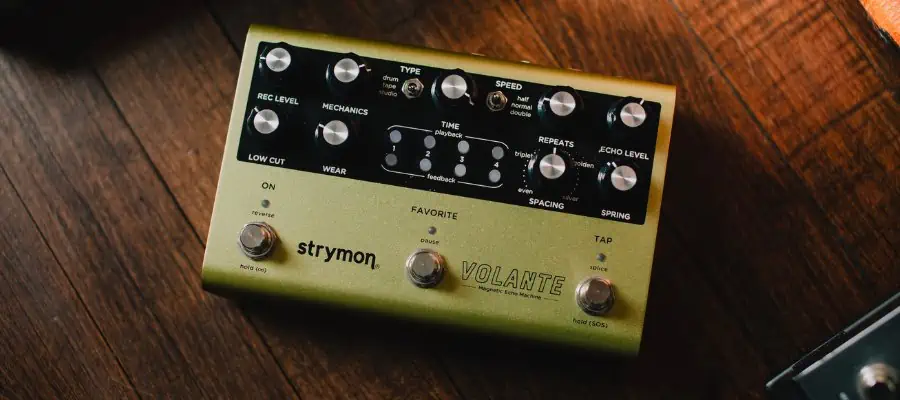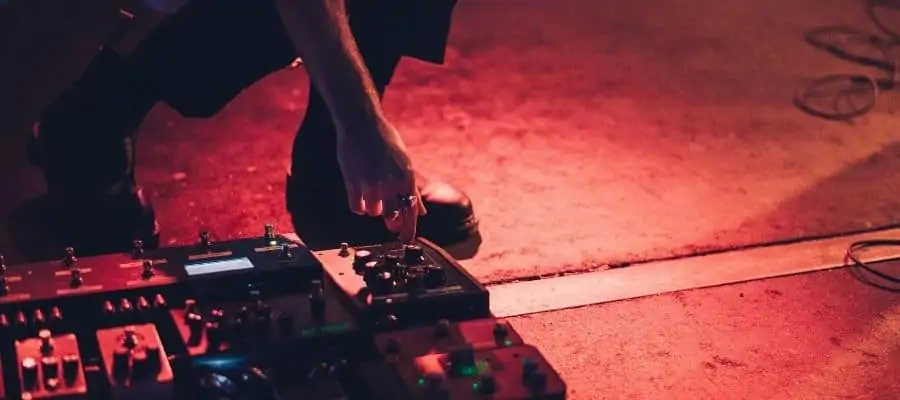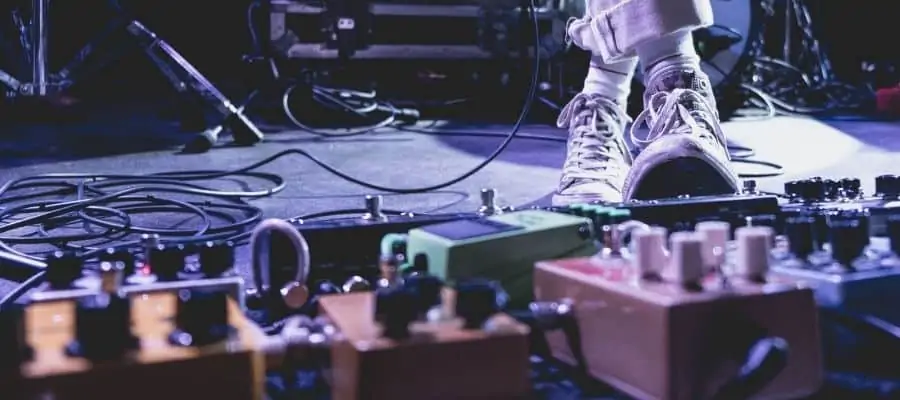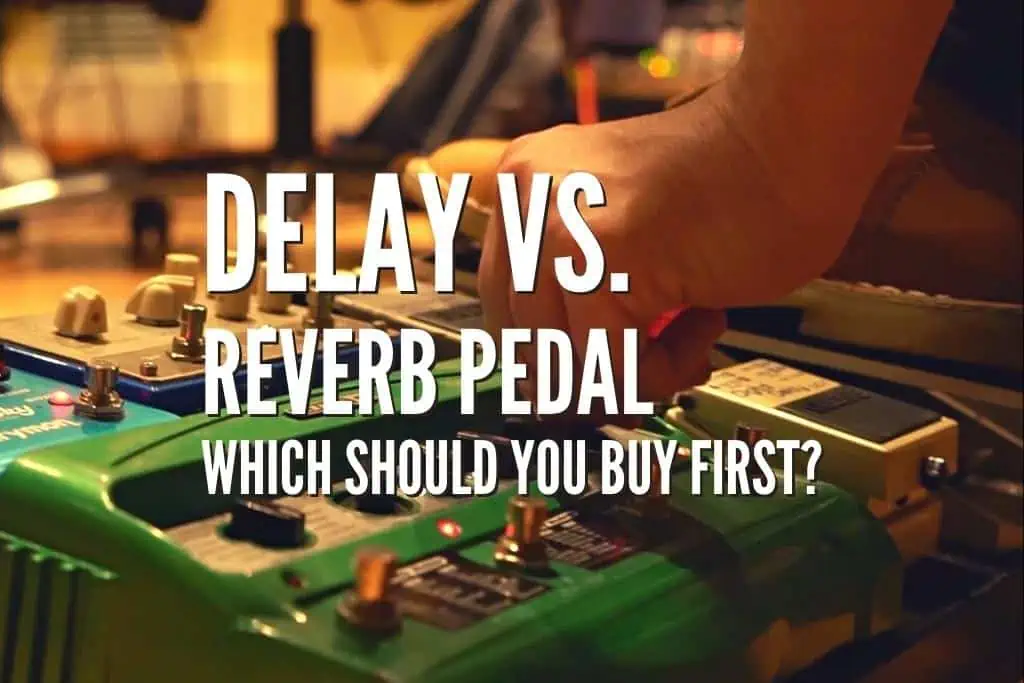Delay and reverb pedals can both alter the sound of electric guitars by adding time-based effects; however, while the former creates an echo, the latter adds a sense of space and depth to the sound by simulating the reflections of sound waves in a physical space. Since they’re not interchangeable, those looking to enhance their performance need to get them separately. However, when your budget is a factor, which one to get first?
Most guitarists get a delay pedal before a reverb pedal; however, this is a personal choice dependent on each musician’s preferences and priorities. Delay pedals are usually prioritized because they’re more versatile and can even replicate a reverb effect when set correctly.
If you’re looking to invest in a sound-enhancing pedal and aren’t sure which options would make a better purchase, you’ve come to the right place. Below, I’ll cover all the factors you need to consider before making this decision, along with an outline of instances in which one would make a better choice than the other. So, make sure to read on until the end.
Should You Buy a Delay or Reverb Pedal First

Since whether to get a delay or reverb pedal first is ultimately a personal one, in this section, I’ll explore some of the most important factors to consider that can help you make a personalized, well-informed decision.
Budget
Chances are your budget is the factor keeping you from getting both these pedals at once, so it’s worth considering it when choosing between the two.
Though delay and reverb pedals come in a wide range of prices depending on quality, brand, model, and so on, generally speaking, the former tends to be a bit more affordable.
Moreover, as I briefly mentioned above, delay pedals tend to be a bit more versatile, so if you don’t have any specific preferences on the effect you’re trying to achieve, they’ll provide more overall value, which guitarists on a budget need to prioritize.
Playing Style
When you have specific preferences, on the other hand, they’ll be the most important factor to consider throughout this decision-making process. That’s why you’ll want to consider your playing style and how you’re looking to enhance it. Your playing position should also be considered.
For example, a delay pedal might serve you best if you usually play lead guitar and want to add texture and depth to your solos. On the other hand, those after a more atmospheric, ambient sound (usually rhythm guitarists) can get more use out of a reverb pedal.
Since the two pedals add unique, often incomparable effects to your sound, your priorities will ultimately make one a better purchase than the other.
Genre
Given that these pedals are used to achieve two very different effects, the type of music you play can also color your decision.
For example, if you’re more of a pop guitarist looking to create dreamy soundscapes, investing in a reverb pedal is the way to go. However, those who favor more dynamic genres like rock or country will get much more use out of a delay pedal.
Your Current Setup
Before you land on a decision, it’s also essential to consider your current setup and whether you have any existing equipment on your pedal chain.
If you do, consider how adding a reverb or delay pedal will fit in with that existing setup. For example, if you have an overdrive or distortion pedal, adding a delay pedal to the mix would be a great choice since it could help create a more textured and layered sound.
If, after taking into account all of the factors above, you’re still unsure, let me make your job a bit easier by outlining some practical scenarios in which getting either of these pedals would be the right choice for you.
When To Get a Delay Pedal First

Here are some instances in which getting a delay pedal first would be the right choice for you:
- You want to experiment with many versatile settings to create new sounds.
- You play a dynamic genre that requires a lot of rhythmic complexity.
- You play lead guitar and are looking to add some distinctiveness and texture to your sound.
- You have other complementing pedals (e.g., overdrive, distortion) on your chain that can work well with a delay pedal.
- You’re on a tighter budget and aren’t planning on adding any other pedal to your chain for a long time – a delay pedal will offer more versatility.
If at least two of these prompts apply to you, I recommend favoring delay pedals as your purchase of choice. Most guitarists will lean toward these pedals anyway because they’re more versatile. So, if you’re a beginner creating a pedal chain for the first time, I highly recommend waiting on getting a reverb pedal until later.
When To Get a Reverb Pedal First

On the other hand, here are some instances in which getting a reverb pedal first might serve you best:
- You’re specifically after that sense of space and depth that reverb pedals provide.
- You play rhythm guitar and want to create a more subdued, ambient sound.
- You play music that requires a lot of sustain in order to create that dreamy soundscape.
- Your budget allows for a more “specialty” pedal like this, and you plan on getting a delay pedal not too far off in the future.
If your genre, preferences, and style fit the prompts outlined above, I recommend getting a reverb pedal first.
If you still can not decide which pedal to purchase first, another option is to get a multi-effects pedal that offers both effects. There are many budget multi-fx processors with delay and reverb effects simultaneously to give you the utmost versatility. Altough, they won’t have as much detail and control options and maybe as high sound quality as individual pedals, they can give you the advantages of both worlds for satisfactory results.
Conclusion
The decision on whether to get a delay or reverb pedal first is ultimately personal, depending on several factors. These include your budget, playing style, preferred genre, playing position, and current setup.
Remember that both delay and reverb pedals can be extremely valuable tools in a guitarist’s arsenal, so you’ll want to get them both at one point. However, due to their superior versatility, most musicians favor delay pedals as their first purchase and move on to more “specialty” equipment like their reverb counterparts.
If you found this article useful, you may want to save this pin below to your Guitar board.

Recent Posts
Some guitarists insist on buying an expensive amplifier with their electric guitar. They assume that this is a must for every type of guitarist out there. However, in some situations, this isn’t...
Top 50 Free Realistic Guitar VST Plugins With Sound Examples
As technology has rapidly advanced in the recent decade, computers are stealing more and more roles from physical musical instruments and accessories. Nowadays, you do not need expensive amps,...

